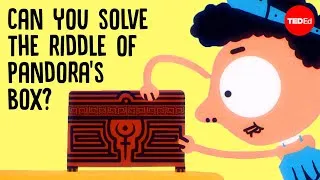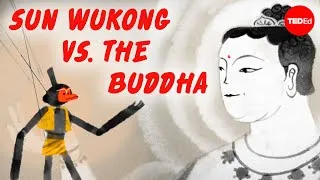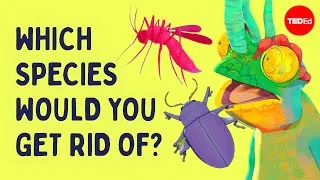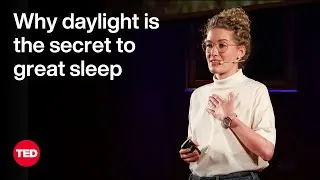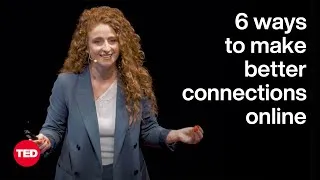How a single-celled organism almost wiped out life on Earth - Anusuya Willis
2,728,892 views ・ 2016-08-11
請雙擊下方英文字幕播放視頻。
譯者: Helen Chang
審譯者: Hsiao russell
00:08
There's an organism
that changed the world.
0
8019
2358
曾有個有機體改變了世界。
00:10
It caused both the first mass extinction
in Earth's history
1
10377
3301
它引起地球史上
第一次物種大滅絕,
00:13
and also paved the way for complex life.
2
13678
2869
也為複雜的生命體鋪了路。
00:16
How?
3
16547
971
如何辦到的?
00:17
By sending the first free oxygen
molecules into our atmosphere,
4
17518
4152
把最初的游離氧分子送入大氣層,
00:21
and they did all this
as single-celled life forms.
5
21670
3469
而且它們僅僅以
單細胞形體就辦到了。
00:25
They're cyanobacteria,
6
25139
1640
它們是藍藻,
00:26
and the story of these simple organisms
7
26779
1897
這些簡單的有機體,
00:28
that don't even have nuclei
or any other organelles
8
28676
2877
儘管沒有細胞核或任何它種胞器,
00:31
is a pivotal chapter
in the story of life on Earth.
9
31553
3306
卻是地球的生命故事裡
舉足輕重的一章。
00:34
Earth's atmosphere wasn't always
the oxygen-rich mixture we breathe today.
10
34859
4630
之前地球的大氣層並不富含氧,
和今天我們呼吸的不一樣。
00:39
3.5 billion years ago, the atmosphere
was mostly nitrogen,
11
39489
3590
三十五億年前,大氣中主要是氮、
00:43
carbon dioxide,
12
43079
1132
二氧化碳,
00:44
and methane.
13
44211
1299
和甲烷。
00:45
Almost all oxygen was locked up
in molecules like water,
14
45510
3152
幾乎所有的氧全被鎖在
像水分子這樣的分子中,
00:48
not floating around in the air.
15
48662
1937
沒在空氣中流動。
00:50
The oceans were populated by
anaerobic microbes.
16
50599
2861
海洋充滿厭氧微生物。
00:53
Those are simple, unicellular life forms
that thrive without oxygen
17
53460
4041
都是些簡單、單細胞,
不靠氧氣成長茁壯的生命形式,
00:57
and get energy by scavenging
what molecules they find.
18
57501
3129
它們是清道夫,
從找到的分子中擷取能量。
01:00
But somewhere between
2.5 and 3.5 billion years ago,
19
60630
3842
但在二十五億到
三十五億年前間的某個時段,
01:04
one of these microbial species,
20
64472
2038
這些微生物的物種之一,
01:06
probably floating
on the surface of the ocean,
21
66510
2320
可能浮到海洋的表面上,
01:08
evolved a new ability: photosynthesis.
22
68830
3181
發展出新的能力:「光合作用」。
01:12
Structures in their cell membrane
could harness the energy from sunlight
23
72011
3581
它們的細胞膜結構會利用太陽能
01:15
to turn carbon dioxide and water
into oxygen gas and sugars,
24
75592
4709
把二氧化碳和水轉化成氧氣,
和它們可用的能量形式:糖。
01:20
which they could use for energy.
25
80301
1691
01:21
Those organisms were the ancestors
of what we now call cyanobacteria.
26
81992
4889
它們是今日「藍藻」的祖先。
01:26
Their bluish color comes from
the blue-green pigments
27
86881
2532
它們的藍顏色來自
能捕捉所需陽光的藍綠色素。
01:29
that capture the sunlight they need.
28
89413
2181
01:31
Photosynthesis gave those ancient bacteria
a huge advantage over other species.
29
91594
4498
光合作用給了那些古老的細菌
其他物種所欠缺的巨大優勢。
01:36
They could now produce their own energy
30
96092
1900
它們能用幾乎無限供應的原料
自己生產能源,
01:37
from an almost endless supply
of raw ingredients,
31
97992
2999
01:40
so their populations exploded
32
100991
2191
所以菌口數爆炸成長。
01:43
and they started polluting the atmosphere
with a new waste product: oxygen.
33
103182
4370
以至於它們的新廢品「氧氣」
開始污染大氣層。
01:47
At first, the trickle of extra oxygen was
soaked up by chemical reactions with iron
34
107552
4535
起初,涓涓細流的額外氧氣
被鐵的化學反應或細胞分解所吸收,
01:52
or decomposing cells,
35
112087
1827
01:53
but after a few hundred million years,
36
113914
1808
但幾億年後,
01:55
the cyanobacteria were producing oxygen
faster than it could be absorbed,
37
115722
3950
藍藻產生氧氣的速度
超過氧氣被吸收的速度,
01:59
and the gas started building up
in the atmosphere.
38
119672
2361
氧氣開始在大氣層中堆積,
02:02
That was a big problem for the rest
of Earth's inhabitants.
39
122033
2946
這對於其他的地球居民而言
是個大問題,
02:04
Oxygen-rich air
was actually toxic to them.
40
124979
2764
實際上富含氧氣的空氣
對其他生物是有毒的。
02:07
The result?
41
127743
888
結果呢?
02:08
About 2.5 billion years ago was a mass
extinction of virtually all life on Earth,
42
128631
5340
約二十五億年前,
幾乎地球上所有的物種都滅絕了,
02:13
which barely spared the cyanobacteria.
43
133971
2302
藍藻只差一點倖免。
02:16
Geologists call this
the Great Oxygenation Event,
44
136273
3080
地質學家稱之為「大氧化事件」,
02:19
or even the Oxygen Catastrophe.
45
139353
2509
或「氧化災變」。
02:21
That wasn't the only problem.
46
141862
1452
那不是唯一的問題。
02:23
Methane had been acting as a potent
greenhouse gas that kept the Earth warm,
47
143314
3600
原先大氣中的「甲烷」
有效地保持地球溫暖,
02:26
but now, the extra oxygen reacted with
methane to form carbon dioxide and water,
48
146914
6011
但是,多出的氧氣與甲烷
產生化學反應,形成二氧化碳和水,
02:32
which don't trap as much heat.
49
152925
1740
大氣再也無法保溫。
02:34
The thinner atmospheric blanket
50
154665
1629
變薄的大氣層毯子
02:36
caused Earth's first,
and possibly longest, ice age,
51
156294
3650
造成地球的第一次,
並可能是最長的一次冰河時期:
02:39
the Huronian Glaciation.
52
159944
1821
「休倫冰期」。
02:41
The planet was basically
one giant snowball
53
161765
2131
那時的大氣毯子
基本上是個巨大的雪球,
02:43
for several hundred million years.
54
163896
2227
持續了幾億年。
02:46
Eventually, life adjusted.
55
166123
1922
最終,生物體適應了。
02:48
Aerobic organisms,
which can use oxygen for energy,
56
168045
3320
可利用氧為能源的「好氧生物」
02:51
started sopping up some of the excess
gas in the atmosphere.
57
171365
3532
開始吸收大氣中多餘的氧氣。
02:54
The oxygen concentration rose and fell
58
174897
2118
氧濃度上升、下跌,
02:57
until eventually it reached
the approximate 21% we have today.
59
177015
4080
最終達到我們今天的 21% 左右。
03:01
And being able to use
the chemical energy in oxygen
60
181095
2780
因能使用氧氣的化學能
03:03
gave organisms the boost they needed
to diversify
61
183875
2951
促使生物多樣化,
03:06
and evolve more complex forms.
62
186826
2389
並且進化成更複雜的形式。
03:09
Cyanobacteria had a part
to play in that story, too.
63
189215
3202
藍藻在這個故事中
也扮演了一個角色。
03:12
Hundreds of millions of years ago,
64
192417
1778
數億年前,
03:14
some other prehistoric microbe
swallowed a cyanobacterium whole
65
194195
4543
某些史前微生物吞下藍藻,
03:18
in a process called endosymbiosis.
66
198738
2818
這過程被稱為「內共生」。
03:21
In doing so, that microbe acquired
its own internal photosynthesis factory.
67
201556
4480
這使得該微生物有了
自己的光合作用工廠。
03:26
This was the ancestor of plant cells.
68
206036
2970
這就是植物細胞的始祖。
03:29
And cyanobacteria became chloroplasts,
69
209006
3130
藍藻成為「葉綠體」,
03:32
the organelles that carry out
photosynthesis today.
70
212136
3192
也就是今日進行光合作用的胞器。
03:35
Cyanobacteria are still around
in almost every environment on Earth:
71
215328
4139
藍藻仍然存在於
幾乎每個地球的環境:
03:39
oceans,
72
219467
840
海洋、
03:40
fresh water,
73
220307
898
淡水、
03:41
soil,
74
221205
811
土壤、
03:42
antarctic rocks,
75
222016
1151
南極岩石、
03:43
sloth fur.
76
223167
1192
樹懶的毛皮。
03:44
They still pump oxygen
into the atmosphere,
77
224359
2039
藍藻仍然把氧氣送到大氣層中;
03:46
and they also pull nitrogen out to
fertilize the plants they helped create.
78
226398
4639
它們還自大氣中拉氮出來,
為它們協助創造的植物施肥。
03:51
We wouldn't recognize life on Earth
without them.
79
231037
2180
若沒有他們,我們將無法認出
地球上的生命。
03:53
But also thanks to them,
80
233217
1220
然而也因為它們,
03:54
we almost didn't have
life on Earth at all.
81
234437
2161
地球差點兒沒有任何的生命。
New videos
Original video on YouTube.com
關於本網站
本網站將向您介紹對學習英語有用的 YouTube 視頻。 您將看到來自世界各地的一流教師教授的英語課程。 雙擊每個視頻頁面上顯示的英文字幕,從那裡播放視頻。 字幕與視頻播放同步滾動。 如果您有任何意見或要求,請使用此聯繫表與我們聯繫。


